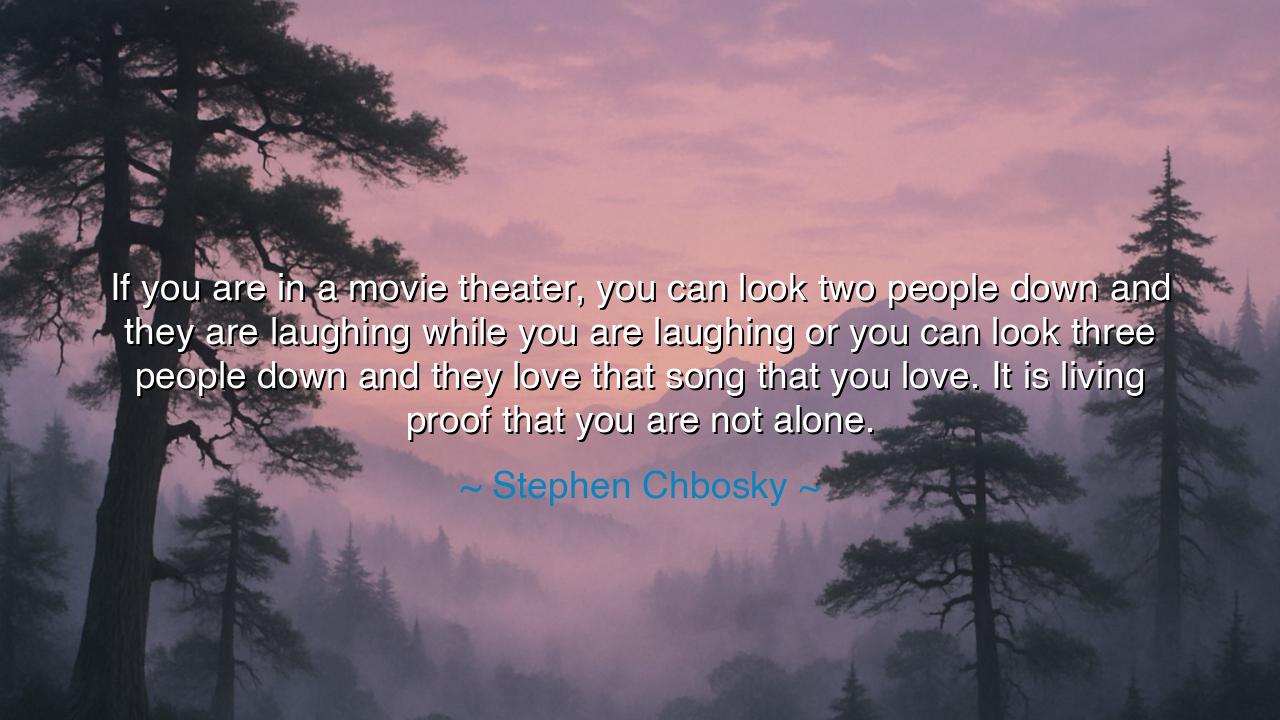
If you are in a movie theater, you can look two people down and
If you are in a movie theater, you can look two people down and they are laughing while you are laughing or you can look three people down and they love that song that you love. It is living proof that you are not alone.






In the tender and luminous words of Stephen Chbosky, the author who gave voice to the quiet ache of youth, we find a truth both simple and eternal: “If you are in a movie theater, you can look two people down and they are laughing while you are laughing or you can look three people down and they love that song that you love. It is living proof that you are not alone.” These words, though soft in tone, carry the resonance of an ancient promise — that even in our solitude, the thread of connection binds us one to another, invisible yet unbreakable. Chbosky reminds us that shared experience, no matter how small, is a glimpse of the divine unity that dwells within the human heart.
The origin of this thought lies in Chbosky’s lifelong devotion to exploring the hidden inner worlds of ordinary people. As the author of The Perks of Being a Wallflower, he gave voice to those who feel unseen — the dreamers, the outsiders, the quiet souls who move through the noise of the world wondering if anyone truly understands them. In this quote, Chbosky reflects on the sacred spaces where art becomes communion — the movie theater, the concert hall, the shared silence before a story begins. It is there, he tells us, that we discover something profound: that our laughter, our tears, our love for a song or a scene, is not ours alone. In those moments, our hearts beat in rhythm with countless others, and we realize that we were never truly isolated, only unaware of our belonging.
The ancients, too, would have recognized this truth. The poets of Greece gathered their people in amphitheaters, where by the flickering torchlight of the tragedies, men and women wept together for heroes who had never lived — and in those tears, they found unity. The philosophers taught that mankind is one body with many parts, each soul a note in the vast harmony of creation. Even the early storytellers of the desert and the forest spoke by firelight, drawing circles of fellowship through their tales. Chbosky’s insight is a modern echo of that eternal song: that to feel together is the essence of being human.
Consider the life of Anne Frank, who wrote her diary while hidden away from a world at war. In her small room, she might have felt utterly alone. Yet the words she penned in solitude became the voice of millions who have known fear and hope intertwined. Generations later, when readers cry at her words, they are joined with her spirit — proof that even in the darkest confinement, connection endures. Her isolation became the very seed of communion, as Chbosky describes: the recognition that in the depths of our private feelings, we touch the universal.
This is the heart of Chbosky’s wisdom: that loneliness is often the illusion born from the silence between souls. We walk through life believing our joys and sorrows are ours alone, when in truth, the same emotions ripple through every heart we pass. When we laugh in a darkened theater and another laughs beside us, when a song brings tears to our eyes and someone else hums the same melody — these are not coincidences, but glimpses of the hidden network of spirit that binds humanity together. In such moments, the boundaries of self dissolve, and we glimpse what the mystics called oneness — that sacred sense of belonging to something vast and eternal.
And yet, this truth demands mindfulness. To see that we are not alone, we must learn to look up — to notice the faces near us, the small sparks of recognition, the shared breath of laughter. In a world that often encourages isolation, we must become seekers of these moments of connection. When you watch a film, listen to a song, or walk through a crowded street, open your senses to the quiet symphony of togetherness. Realize that others carry the same fears, the same hopes, the same longing for meaning. To live with awareness of this unity is to live with compassion, for you begin to see yourself reflected in every other.
Therefore, my child, take this teaching to heart: when you feel the shadow of loneliness, do not despair. Look outward — toward the laughter of strangers, the music of crowds, the pulse of life around you. See how your emotions echo through others, how your joy and sorrow are shared across unseen distances. This is living proof that you belong to something greater than yourself — the endless communion of hearts that has no beginning and no end.
So let Stephen Chbosky’s words be your comfort and your calling: when you find yourself in the dark, whether in a theater or in life, remember that others sit beside you — breathing, feeling, hoping — as you do. You are not alone. You never were. The laughter of another is your own reflected back; the tears of another are your own made visible. In this shared humanity lies our greatest salvation — that even in silence, we are together, and in every story, the heart of the world beats as one.






AAdministratorAdministrator
Welcome, honored guests. Please leave a comment, we will respond soon